Analyzing Legal, Ethical, and Value Issues in Healthcare: Case Study
VerifiedAdded on 2023/06/15
|8
|3094
|255
Case Study
AI Summary
This case study analyzes a scenario involving a 23-year-old patient named Blessing, admitted to the hospital with profuse bleeding, highlighting key issues related to law, ethics, and values within healthcare. The legal aspect focuses on safeguarding patients from harm and negligence, particularly in light of a pelvic exam incident causing injury, potentially constituting medical malpractice. Ethically, the case examines patient autonomy and informed consent, noting a lack of regular communication and updates regarding Blessing's medical status, raising concerns about her ability to make informed decisions. The analysis also explores the value of patient confidentiality, emphasizing the importance of maintaining privacy and trust, especially given Blessing's comfort in sharing personal information with the nurses. The case study stresses the interconnectedness of healthcare and social aspects, advocating for improved training, ethical behavior, and robust communication to ensure patient safety and uphold their rights and values. Desklib provides solved assignments and past papers for students.
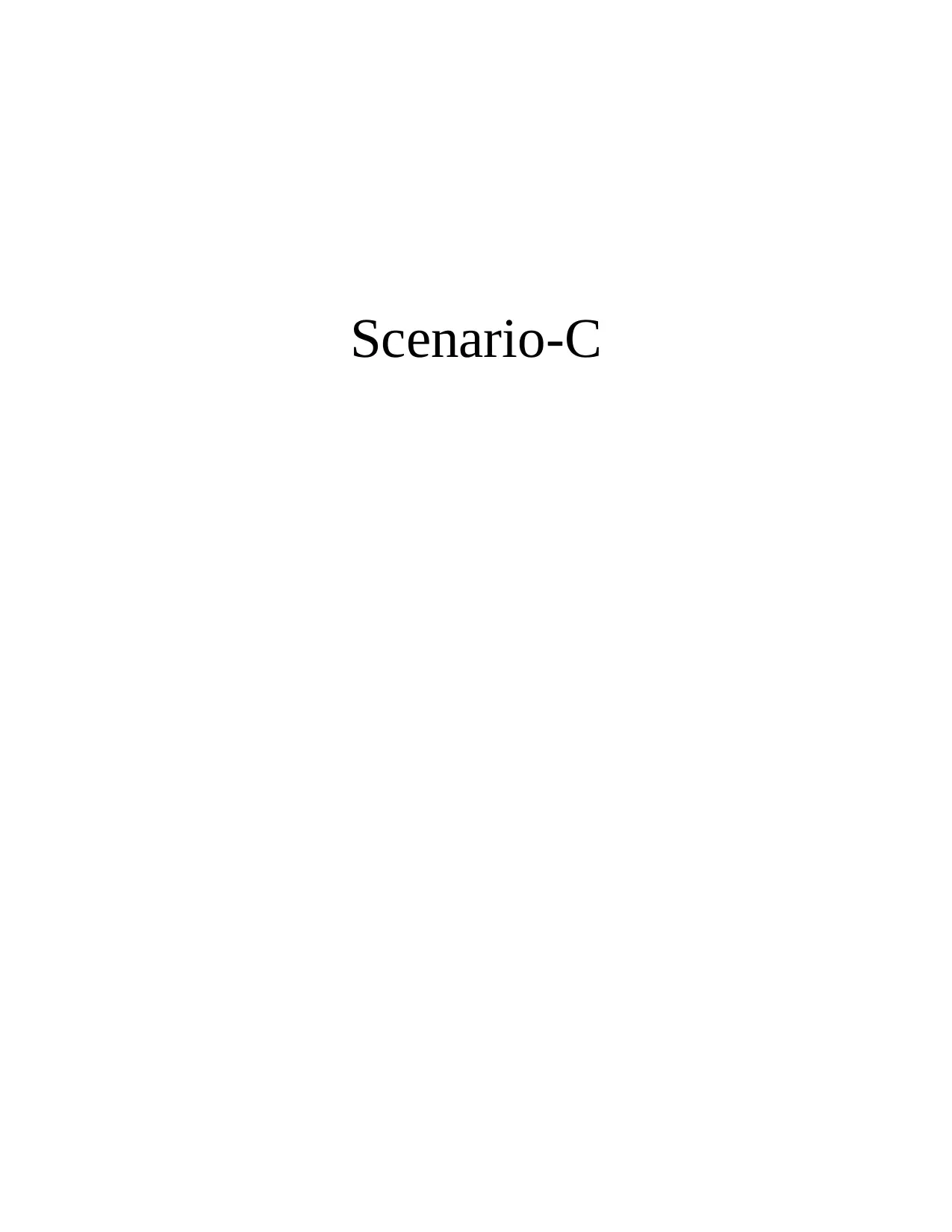
Scenario-C
Paraphrase This Document
Need a fresh take? Get an instant paraphrase of this document with our AI Paraphraser
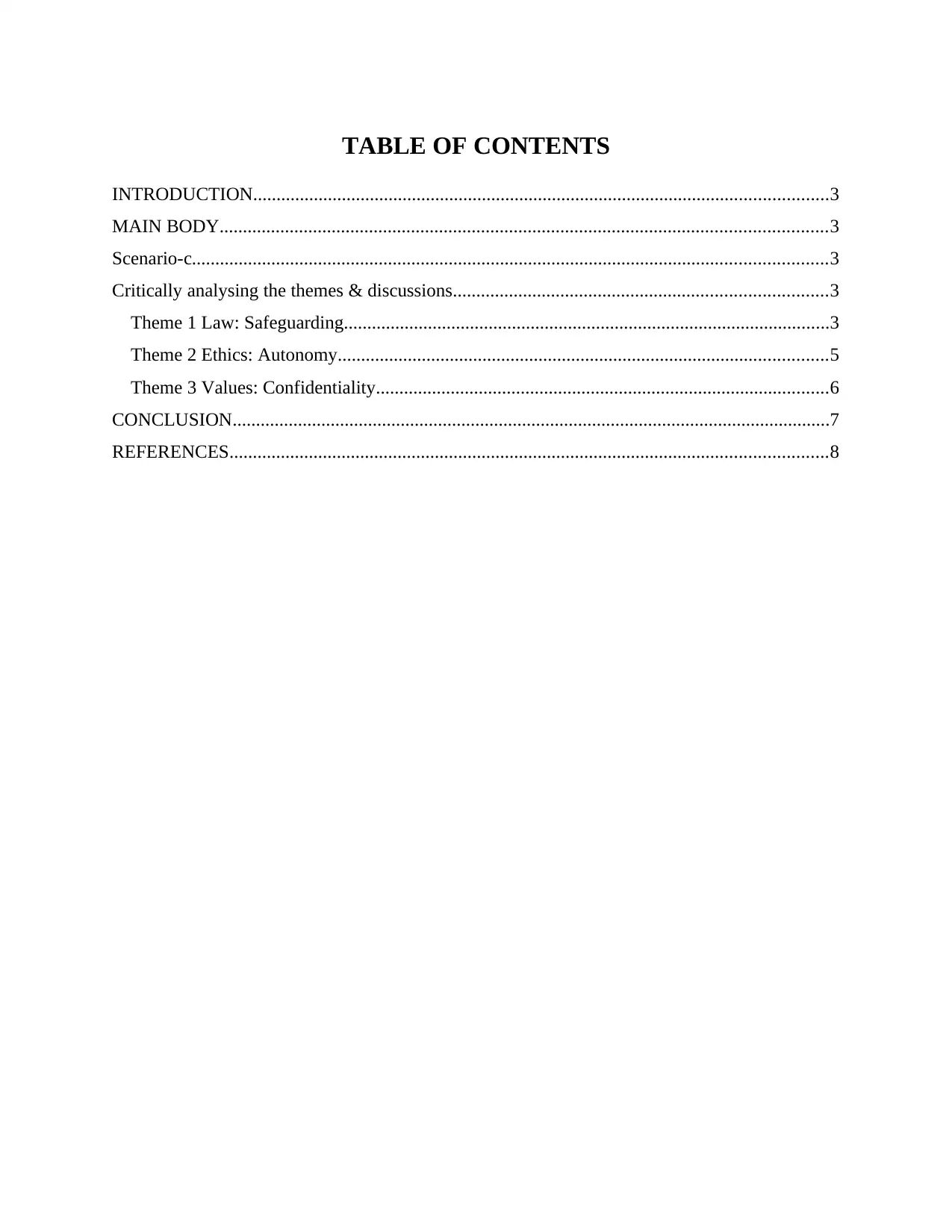
TABLE OF CONTENTS
INTRODUCTION...........................................................................................................................3
MAIN BODY..................................................................................................................................3
Scenario-c........................................................................................................................................3
Critically analysing the themes & discussions................................................................................3
Theme 1 Law: Safeguarding........................................................................................................3
Theme 2 Ethics: Autonomy.........................................................................................................5
Theme 3 Values: Confidentiality.................................................................................................6
CONCLUSION................................................................................................................................7
REFERENCES................................................................................................................................8
INTRODUCTION...........................................................................................................................3
MAIN BODY..................................................................................................................................3
Scenario-c........................................................................................................................................3
Critically analysing the themes & discussions................................................................................3
Theme 1 Law: Safeguarding........................................................................................................3
Theme 2 Ethics: Autonomy.........................................................................................................5
Theme 3 Values: Confidentiality.................................................................................................6
CONCLUSION................................................................................................................................7
REFERENCES................................................................................................................................8
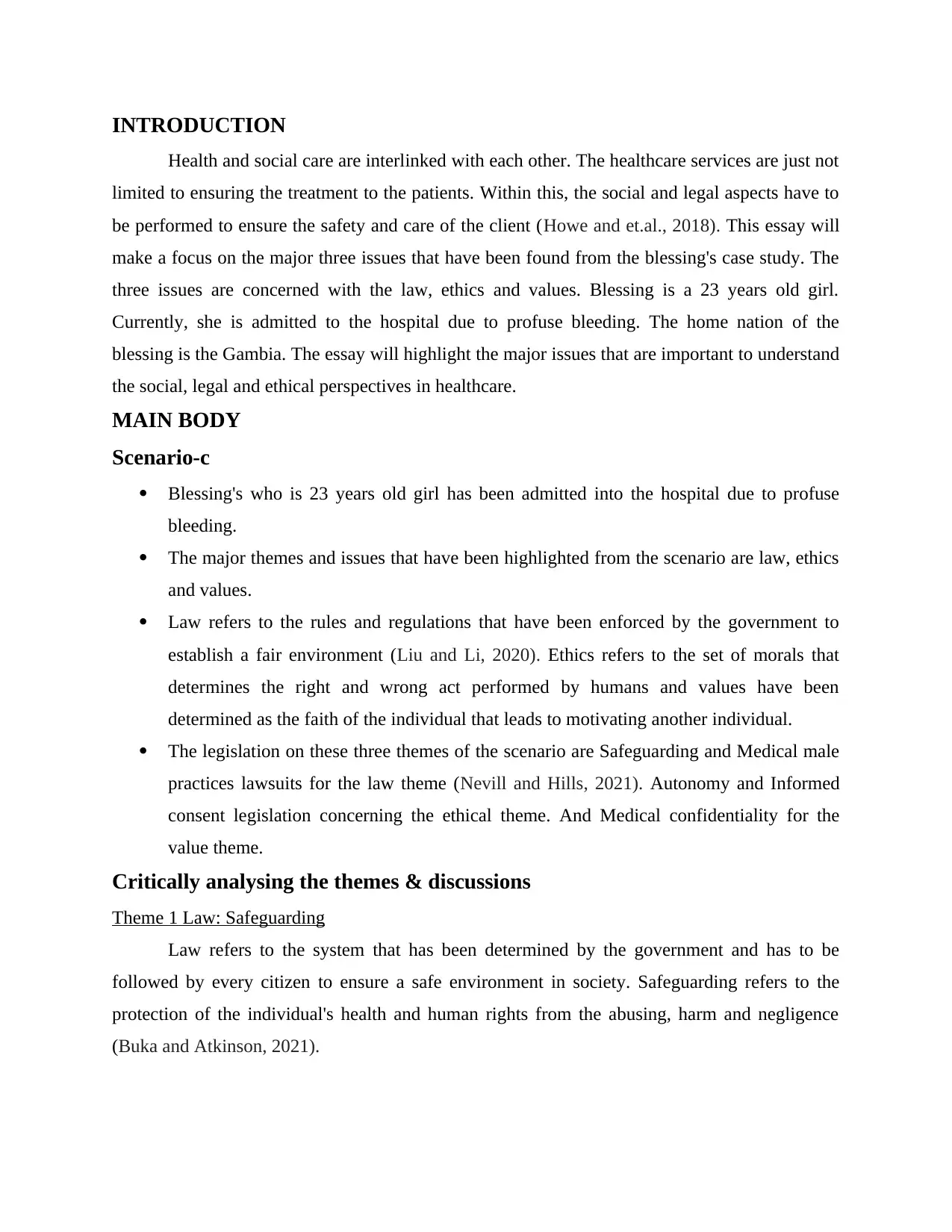
INTRODUCTION
Health and social care are interlinked with each other. The healthcare services are just not
limited to ensuring the treatment to the patients. Within this, the social and legal aspects have to
be performed to ensure the safety and care of the client (Howe and et.al., 2018). This essay will
make a focus on the major three issues that have been found from the blessing's case study. The
three issues are concerned with the law, ethics and values. Blessing is a 23 years old girl.
Currently, she is admitted to the hospital due to profuse bleeding. The home nation of the
blessing is the Gambia. The essay will highlight the major issues that are important to understand
the social, legal and ethical perspectives in healthcare.
MAIN BODY
Scenario-c
Blessing's who is 23 years old girl has been admitted into the hospital due to profuse
bleeding.
The major themes and issues that have been highlighted from the scenario are law, ethics
and values.
Law refers to the rules and regulations that have been enforced by the government to
establish a fair environment (Liu and Li, 2020). Ethics refers to the set of morals that
determines the right and wrong act performed by humans and values have been
determined as the faith of the individual that leads to motivating another individual.
The legislation on these three themes of the scenario are Safeguarding and Medical male
practices lawsuits for the law theme (Nevill and Hills, 2021). Autonomy and Informed
consent legislation concerning the ethical theme. And Medical confidentiality for the
value theme.
Critically analysing the themes & discussions
Theme 1 Law: Safeguarding
Law refers to the system that has been determined by the government and has to be
followed by every citizen to ensure a safe environment in society. Safeguarding refers to the
protection of the individual's health and human rights from the abusing, harm and negligence
(Buka and Atkinson, 2021).
Health and social care are interlinked with each other. The healthcare services are just not
limited to ensuring the treatment to the patients. Within this, the social and legal aspects have to
be performed to ensure the safety and care of the client (Howe and et.al., 2018). This essay will
make a focus on the major three issues that have been found from the blessing's case study. The
three issues are concerned with the law, ethics and values. Blessing is a 23 years old girl.
Currently, she is admitted to the hospital due to profuse bleeding. The home nation of the
blessing is the Gambia. The essay will highlight the major issues that are important to understand
the social, legal and ethical perspectives in healthcare.
MAIN BODY
Scenario-c
Blessing's who is 23 years old girl has been admitted into the hospital due to profuse
bleeding.
The major themes and issues that have been highlighted from the scenario are law, ethics
and values.
Law refers to the rules and regulations that have been enforced by the government to
establish a fair environment (Liu and Li, 2020). Ethics refers to the set of morals that
determines the right and wrong act performed by humans and values have been
determined as the faith of the individual that leads to motivating another individual.
The legislation on these three themes of the scenario are Safeguarding and Medical male
practices lawsuits for the law theme (Nevill and Hills, 2021). Autonomy and Informed
consent legislation concerning the ethical theme. And Medical confidentiality for the
value theme.
Critically analysing the themes & discussions
Theme 1 Law: Safeguarding
Law refers to the system that has been determined by the government and has to be
followed by every citizen to ensure a safe environment in society. Safeguarding refers to the
protection of the individual's health and human rights from the abusing, harm and negligence
(Buka and Atkinson, 2021).
⊘ This is a preview!⊘
Do you want full access?
Subscribe today to unlock all pages.

Trusted by 1+ million students worldwide
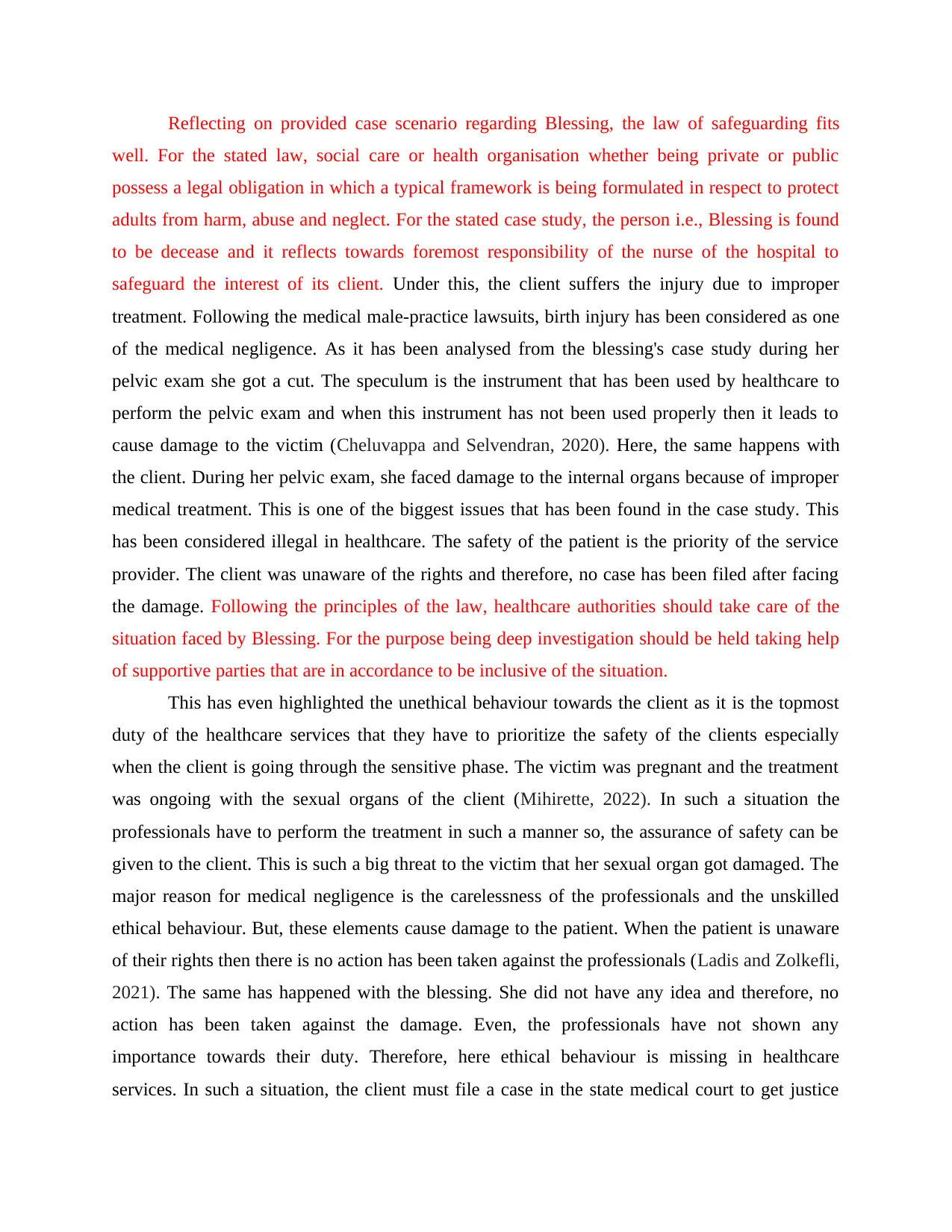
Reflecting on provided case scenario regarding Blessing, the law of safeguarding fits
well. For the stated law, social care or health organisation whether being private or public
possess a legal obligation in which a typical framework is being formulated in respect to protect
adults from harm, abuse and neglect. For the stated case study, the person i.e., Blessing is found
to be decease and it reflects towards foremost responsibility of the nurse of the hospital to
safeguard the interest of its client. Under this, the client suffers the injury due to improper
treatment. Following the medical male-practice lawsuits, birth injury has been considered as one
of the medical negligence. As it has been analysed from the blessing's case study during her
pelvic exam she got a cut. The speculum is the instrument that has been used by healthcare to
perform the pelvic exam and when this instrument has not been used properly then it leads to
cause damage to the victim (Cheluvappa and Selvendran, 2020). Here, the same happens with
the client. During her pelvic exam, she faced damage to the internal organs because of improper
medical treatment. This is one of the biggest issues that has been found in the case study. This
has been considered illegal in healthcare. The safety of the patient is the priority of the service
provider. The client was unaware of the rights and therefore, no case has been filed after facing
the damage. Following the principles of the law, healthcare authorities should take care of the
situation faced by Blessing. For the purpose being deep investigation should be held taking help
of supportive parties that are in accordance to be inclusive of the situation.
This has even highlighted the unethical behaviour towards the client as it is the topmost
duty of the healthcare services that they have to prioritize the safety of the clients especially
when the client is going through the sensitive phase. The victim was pregnant and the treatment
was ongoing with the sexual organs of the client (Mihirette, 2022). In such a situation the
professionals have to perform the treatment in such a manner so, the assurance of safety can be
given to the client. This is such a big threat to the victim that her sexual organ got damaged. The
major reason for medical negligence is the carelessness of the professionals and the unskilled
ethical behaviour. But, these elements cause damage to the patient. When the patient is unaware
of their rights then there is no action has been taken against the professionals (Ladis and Zolkefli,
2021). The same has happened with the blessing. She did not have any idea and therefore, no
action has been taken against the damage. Even, the professionals have not shown any
importance towards their duty. Therefore, here ethical behaviour is missing in healthcare
services. In such a situation, the client must file a case in the state medical court to get justice
well. For the stated law, social care or health organisation whether being private or public
possess a legal obligation in which a typical framework is being formulated in respect to protect
adults from harm, abuse and neglect. For the stated case study, the person i.e., Blessing is found
to be decease and it reflects towards foremost responsibility of the nurse of the hospital to
safeguard the interest of its client. Under this, the client suffers the injury due to improper
treatment. Following the medical male-practice lawsuits, birth injury has been considered as one
of the medical negligence. As it has been analysed from the blessing's case study during her
pelvic exam she got a cut. The speculum is the instrument that has been used by healthcare to
perform the pelvic exam and when this instrument has not been used properly then it leads to
cause damage to the victim (Cheluvappa and Selvendran, 2020). Here, the same happens with
the client. During her pelvic exam, she faced damage to the internal organs because of improper
medical treatment. This is one of the biggest issues that has been found in the case study. This
has been considered illegal in healthcare. The safety of the patient is the priority of the service
provider. The client was unaware of the rights and therefore, no case has been filed after facing
the damage. Following the principles of the law, healthcare authorities should take care of the
situation faced by Blessing. For the purpose being deep investigation should be held taking help
of supportive parties that are in accordance to be inclusive of the situation.
This has even highlighted the unethical behaviour towards the client as it is the topmost
duty of the healthcare services that they have to prioritize the safety of the clients especially
when the client is going through the sensitive phase. The victim was pregnant and the treatment
was ongoing with the sexual organs of the client (Mihirette, 2022). In such a situation the
professionals have to perform the treatment in such a manner so, the assurance of safety can be
given to the client. This is such a big threat to the victim that her sexual organ got damaged. The
major reason for medical negligence is the carelessness of the professionals and the unskilled
ethical behaviour. But, these elements cause damage to the patient. When the patient is unaware
of their rights then there is no action has been taken against the professionals (Ladis and Zolkefli,
2021). The same has happened with the blessing. She did not have any idea and therefore, no
action has been taken against the damage. Even, the professionals have not shown any
importance towards their duty. Therefore, here ethical behaviour is missing in healthcare
services. In such a situation, the client must file a case in the state medical court to get justice
Paraphrase This Document
Need a fresh take? Get an instant paraphrase of this document with our AI Paraphraser
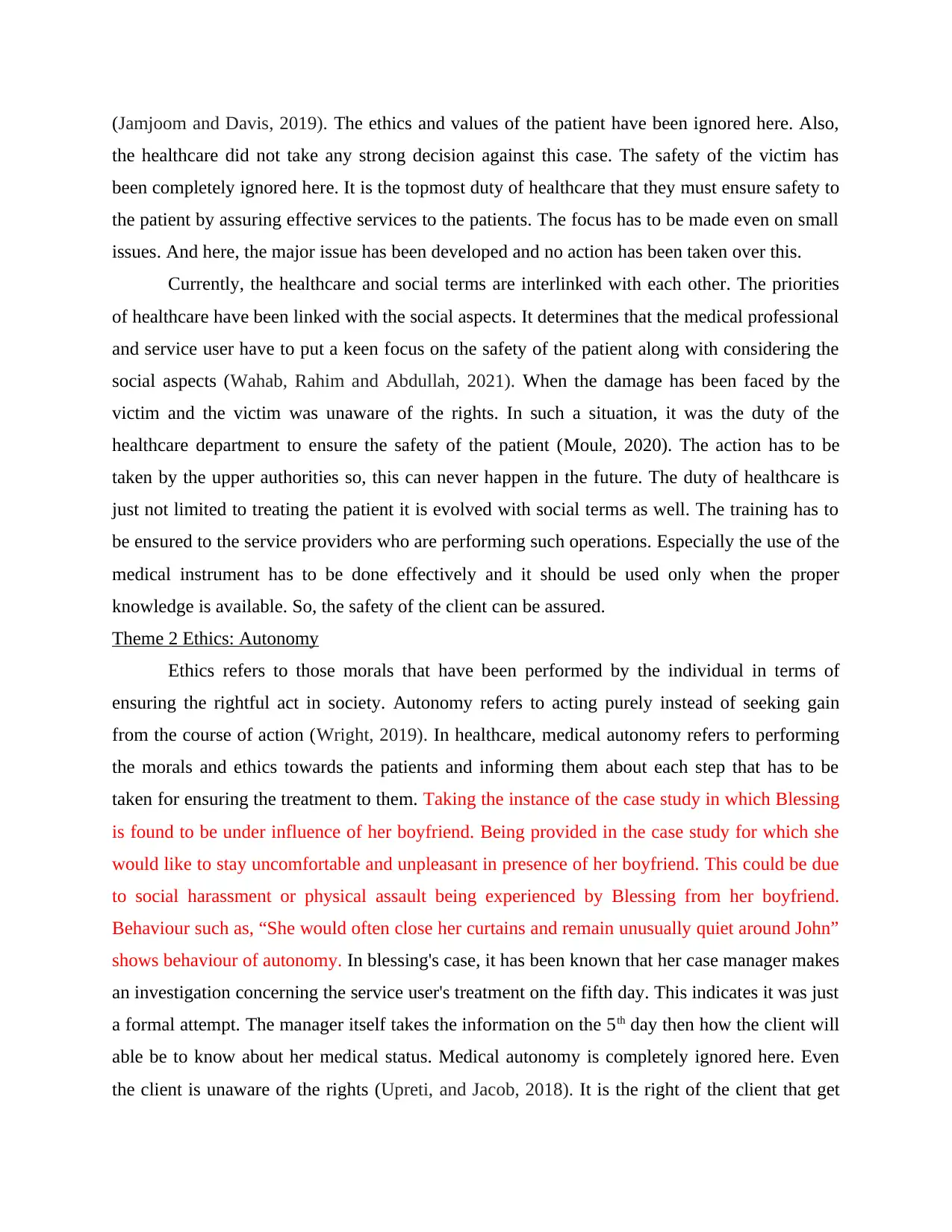
(Jamjoom and Davis, 2019). The ethics and values of the patient have been ignored here. Also,
the healthcare did not take any strong decision against this case. The safety of the victim has
been completely ignored here. It is the topmost duty of healthcare that they must ensure safety to
the patient by assuring effective services to the patients. The focus has to be made even on small
issues. And here, the major issue has been developed and no action has been taken over this.
Currently, the healthcare and social terms are interlinked with each other. The priorities
of healthcare have been linked with the social aspects. It determines that the medical professional
and service user have to put a keen focus on the safety of the patient along with considering the
social aspects (Wahab, Rahim and Abdullah, 2021). When the damage has been faced by the
victim and the victim was unaware of the rights. In such a situation, it was the duty of the
healthcare department to ensure the safety of the patient (Moule, 2020). The action has to be
taken by the upper authorities so, this can never happen in the future. The duty of healthcare is
just not limited to treating the patient it is evolved with social terms as well. The training has to
be ensured to the service providers who are performing such operations. Especially the use of the
medical instrument has to be done effectively and it should be used only when the proper
knowledge is available. So, the safety of the client can be assured.
Theme 2 Ethics: Autonomy
Ethics refers to those morals that have been performed by the individual in terms of
ensuring the rightful act in society. Autonomy refers to acting purely instead of seeking gain
from the course of action (Wright, 2019). In healthcare, medical autonomy refers to performing
the morals and ethics towards the patients and informing them about each step that has to be
taken for ensuring the treatment to them. Taking the instance of the case study in which Blessing
is found to be under influence of her boyfriend. Being provided in the case study for which she
would like to stay uncomfortable and unpleasant in presence of her boyfriend. This could be due
to social harassment or physical assault being experienced by Blessing from her boyfriend.
Behaviour such as, “She would often close her curtains and remain unusually quiet around John”
shows behaviour of autonomy. In blessing's case, it has been known that her case manager makes
an investigation concerning the service user's treatment on the fifth day. This indicates it was just
a formal attempt. The manager itself takes the information on the 5th day then how the client will
able be to know about her medical status. Medical autonomy is completely ignored here. Even
the client is unaware of the rights (Upreti, and Jacob, 2018). It is the right of the client that get
the healthcare did not take any strong decision against this case. The safety of the victim has
been completely ignored here. It is the topmost duty of healthcare that they must ensure safety to
the patient by assuring effective services to the patients. The focus has to be made even on small
issues. And here, the major issue has been developed and no action has been taken over this.
Currently, the healthcare and social terms are interlinked with each other. The priorities
of healthcare have been linked with the social aspects. It determines that the medical professional
and service user have to put a keen focus on the safety of the patient along with considering the
social aspects (Wahab, Rahim and Abdullah, 2021). When the damage has been faced by the
victim and the victim was unaware of the rights. In such a situation, it was the duty of the
healthcare department to ensure the safety of the patient (Moule, 2020). The action has to be
taken by the upper authorities so, this can never happen in the future. The duty of healthcare is
just not limited to treating the patient it is evolved with social terms as well. The training has to
be ensured to the service providers who are performing such operations. Especially the use of the
medical instrument has to be done effectively and it should be used only when the proper
knowledge is available. So, the safety of the client can be assured.
Theme 2 Ethics: Autonomy
Ethics refers to those morals that have been performed by the individual in terms of
ensuring the rightful act in society. Autonomy refers to acting purely instead of seeking gain
from the course of action (Wright, 2019). In healthcare, medical autonomy refers to performing
the morals and ethics towards the patients and informing them about each step that has to be
taken for ensuring the treatment to them. Taking the instance of the case study in which Blessing
is found to be under influence of her boyfriend. Being provided in the case study for which she
would like to stay uncomfortable and unpleasant in presence of her boyfriend. This could be due
to social harassment or physical assault being experienced by Blessing from her boyfriend.
Behaviour such as, “She would often close her curtains and remain unusually quiet around John”
shows behaviour of autonomy. In blessing's case, it has been known that her case manager makes
an investigation concerning the service user's treatment on the fifth day. This indicates it was just
a formal attempt. The manager itself takes the information on the 5th day then how the client will
able be to know about her medical status. Medical autonomy is completely ignored here. Even
the client is unaware of the rights (Upreti, and Jacob, 2018). It is the right of the client that get
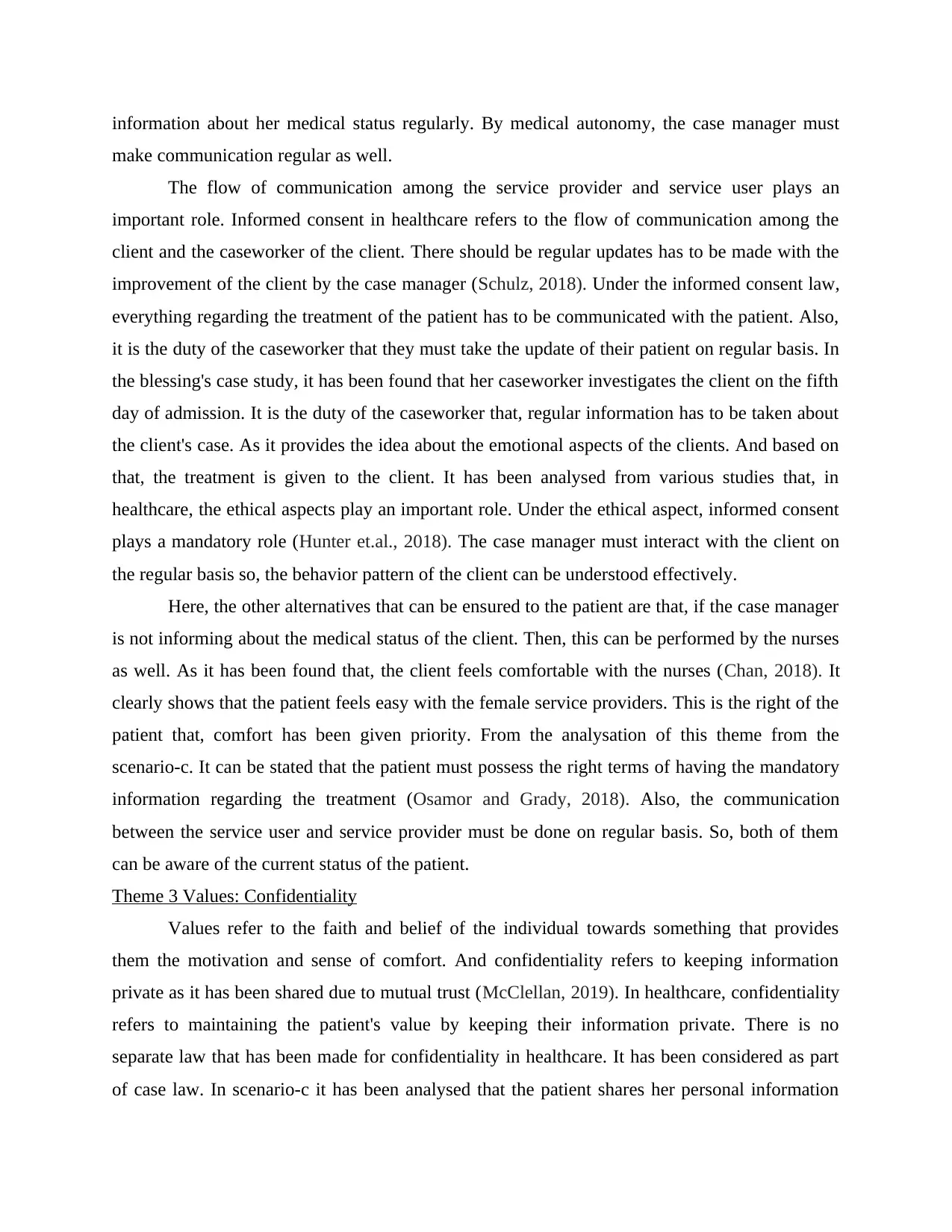
information about her medical status regularly. By medical autonomy, the case manager must
make communication regular as well.
The flow of communication among the service provider and service user plays an
important role. Informed consent in healthcare refers to the flow of communication among the
client and the caseworker of the client. There should be regular updates has to be made with the
improvement of the client by the case manager (Schulz, 2018). Under the informed consent law,
everything regarding the treatment of the patient has to be communicated with the patient. Also,
it is the duty of the caseworker that they must take the update of their patient on regular basis. In
the blessing's case study, it has been found that her caseworker investigates the client on the fifth
day of admission. It is the duty of the caseworker that, regular information has to be taken about
the client's case. As it provides the idea about the emotional aspects of the clients. And based on
that, the treatment is given to the client. It has been analysed from various studies that, in
healthcare, the ethical aspects play an important role. Under the ethical aspect, informed consent
plays a mandatory role (Hunter et.al., 2018). The case manager must interact with the client on
the regular basis so, the behavior pattern of the client can be understood effectively.
Here, the other alternatives that can be ensured to the patient are that, if the case manager
is not informing about the medical status of the client. Then, this can be performed by the nurses
as well. As it has been found that, the client feels comfortable with the nurses (Chan, 2018). It
clearly shows that the patient feels easy with the female service providers. This is the right of the
patient that, comfort has been given priority. From the analysation of this theme from the
scenario-c. It can be stated that the patient must possess the right terms of having the mandatory
information regarding the treatment (Osamor and Grady, 2018). Also, the communication
between the service user and service provider must be done on regular basis. So, both of them
can be aware of the current status of the patient.
Theme 3 Values: Confidentiality
Values refer to the faith and belief of the individual towards something that provides
them the motivation and sense of comfort. And confidentiality refers to keeping information
private as it has been shared due to mutual trust (McClellan, 2019). In healthcare, confidentiality
refers to maintaining the patient's value by keeping their information private. There is no
separate law that has been made for confidentiality in healthcare. It has been considered as part
of case law. In scenario-c it has been analysed that the patient shares her personal information
make communication regular as well.
The flow of communication among the service provider and service user plays an
important role. Informed consent in healthcare refers to the flow of communication among the
client and the caseworker of the client. There should be regular updates has to be made with the
improvement of the client by the case manager (Schulz, 2018). Under the informed consent law,
everything regarding the treatment of the patient has to be communicated with the patient. Also,
it is the duty of the caseworker that they must take the update of their patient on regular basis. In
the blessing's case study, it has been found that her caseworker investigates the client on the fifth
day of admission. It is the duty of the caseworker that, regular information has to be taken about
the client's case. As it provides the idea about the emotional aspects of the clients. And based on
that, the treatment is given to the client. It has been analysed from various studies that, in
healthcare, the ethical aspects play an important role. Under the ethical aspect, informed consent
plays a mandatory role (Hunter et.al., 2018). The case manager must interact with the client on
the regular basis so, the behavior pattern of the client can be understood effectively.
Here, the other alternatives that can be ensured to the patient are that, if the case manager
is not informing about the medical status of the client. Then, this can be performed by the nurses
as well. As it has been found that, the client feels comfortable with the nurses (Chan, 2018). It
clearly shows that the patient feels easy with the female service providers. This is the right of the
patient that, comfort has been given priority. From the analysation of this theme from the
scenario-c. It can be stated that the patient must possess the right terms of having the mandatory
information regarding the treatment (Osamor and Grady, 2018). Also, the communication
between the service user and service provider must be done on regular basis. So, both of them
can be aware of the current status of the patient.
Theme 3 Values: Confidentiality
Values refer to the faith and belief of the individual towards something that provides
them the motivation and sense of comfort. And confidentiality refers to keeping information
private as it has been shared due to mutual trust (McClellan, 2019). In healthcare, confidentiality
refers to maintaining the patient's value by keeping their information private. There is no
separate law that has been made for confidentiality in healthcare. It has been considered as part
of case law. In scenario-c it has been analysed that the patient shares her personal information
⊘ This is a preview!⊘
Do you want full access?
Subscribe today to unlock all pages.

Trusted by 1+ million students worldwide
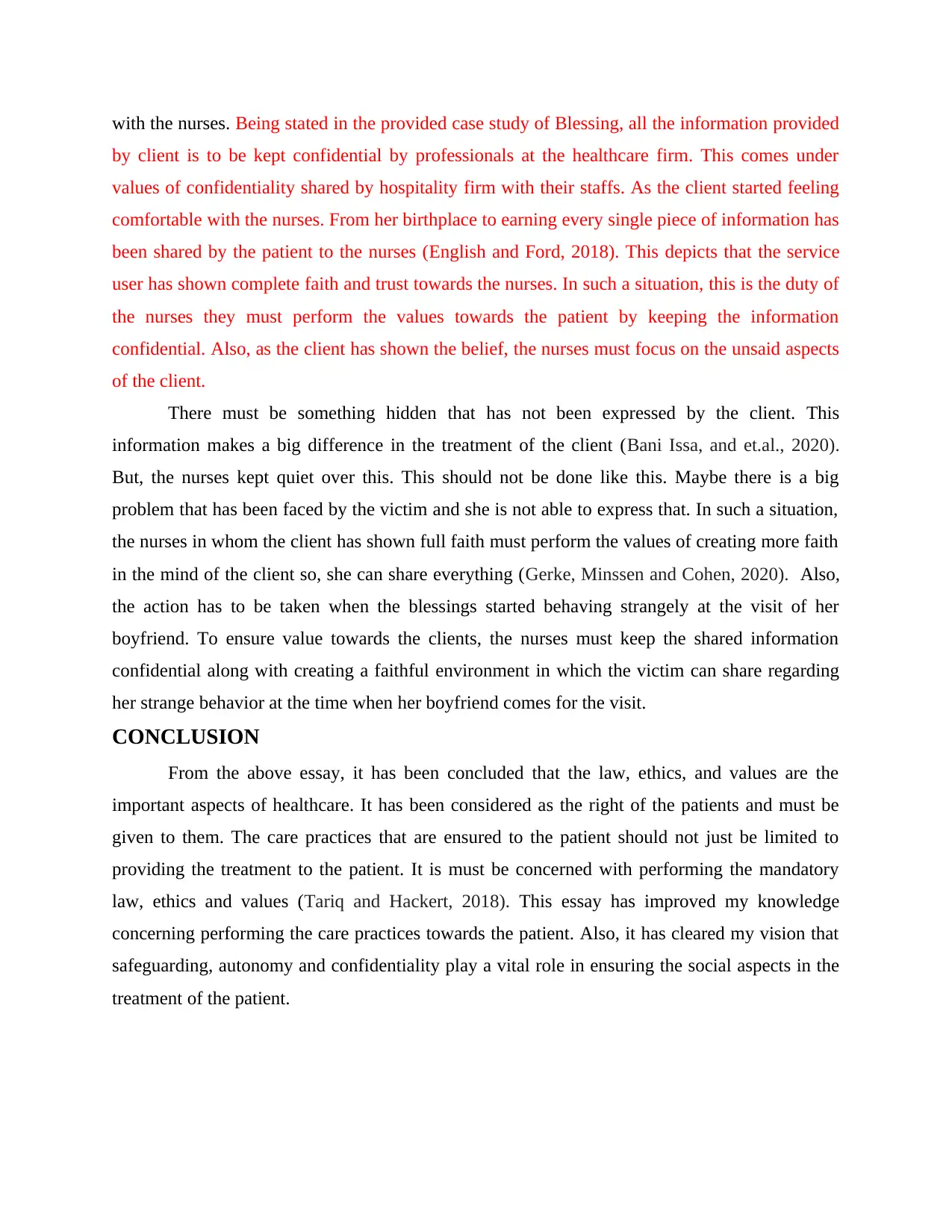
with the nurses. Being stated in the provided case study of Blessing, all the information provided
by client is to be kept confidential by professionals at the healthcare firm. This comes under
values of confidentiality shared by hospitality firm with their staffs. As the client started feeling
comfortable with the nurses. From her birthplace to earning every single piece of information has
been shared by the patient to the nurses (English and Ford, 2018). This depicts that the service
user has shown complete faith and trust towards the nurses. In such a situation, this is the duty of
the nurses they must perform the values towards the patient by keeping the information
confidential. Also, as the client has shown the belief, the nurses must focus on the unsaid aspects
of the client.
There must be something hidden that has not been expressed by the client. This
information makes a big difference in the treatment of the client (Bani Issa, and et.al., 2020).
But, the nurses kept quiet over this. This should not be done like this. Maybe there is a big
problem that has been faced by the victim and she is not able to express that. In such a situation,
the nurses in whom the client has shown full faith must perform the values of creating more faith
in the mind of the client so, she can share everything (Gerke, Minssen and Cohen, 2020). Also,
the action has to be taken when the blessings started behaving strangely at the visit of her
boyfriend. To ensure value towards the clients, the nurses must keep the shared information
confidential along with creating a faithful environment in which the victim can share regarding
her strange behavior at the time when her boyfriend comes for the visit.
CONCLUSION
From the above essay, it has been concluded that the law, ethics, and values are the
important aspects of healthcare. It has been considered as the right of the patients and must be
given to them. The care practices that are ensured to the patient should not just be limited to
providing the treatment to the patient. It is must be concerned with performing the mandatory
law, ethics and values (Tariq and Hackert, 2018). This essay has improved my knowledge
concerning performing the care practices towards the patient. Also, it has cleared my vision that
safeguarding, autonomy and confidentiality play a vital role in ensuring the social aspects in the
treatment of the patient.
by client is to be kept confidential by professionals at the healthcare firm. This comes under
values of confidentiality shared by hospitality firm with their staffs. As the client started feeling
comfortable with the nurses. From her birthplace to earning every single piece of information has
been shared by the patient to the nurses (English and Ford, 2018). This depicts that the service
user has shown complete faith and trust towards the nurses. In such a situation, this is the duty of
the nurses they must perform the values towards the patient by keeping the information
confidential. Also, as the client has shown the belief, the nurses must focus on the unsaid aspects
of the client.
There must be something hidden that has not been expressed by the client. This
information makes a big difference in the treatment of the client (Bani Issa, and et.al., 2020).
But, the nurses kept quiet over this. This should not be done like this. Maybe there is a big
problem that has been faced by the victim and she is not able to express that. In such a situation,
the nurses in whom the client has shown full faith must perform the values of creating more faith
in the mind of the client so, she can share everything (Gerke, Minssen and Cohen, 2020). Also,
the action has to be taken when the blessings started behaving strangely at the visit of her
boyfriend. To ensure value towards the clients, the nurses must keep the shared information
confidential along with creating a faithful environment in which the victim can share regarding
her strange behavior at the time when her boyfriend comes for the visit.
CONCLUSION
From the above essay, it has been concluded that the law, ethics, and values are the
important aspects of healthcare. It has been considered as the right of the patients and must be
given to them. The care practices that are ensured to the patient should not just be limited to
providing the treatment to the patient. It is must be concerned with performing the mandatory
law, ethics and values (Tariq and Hackert, 2018). This essay has improved my knowledge
concerning performing the care practices towards the patient. Also, it has cleared my vision that
safeguarding, autonomy and confidentiality play a vital role in ensuring the social aspects in the
treatment of the patient.
Paraphrase This Document
Need a fresh take? Get an instant paraphrase of this document with our AI Paraphraser
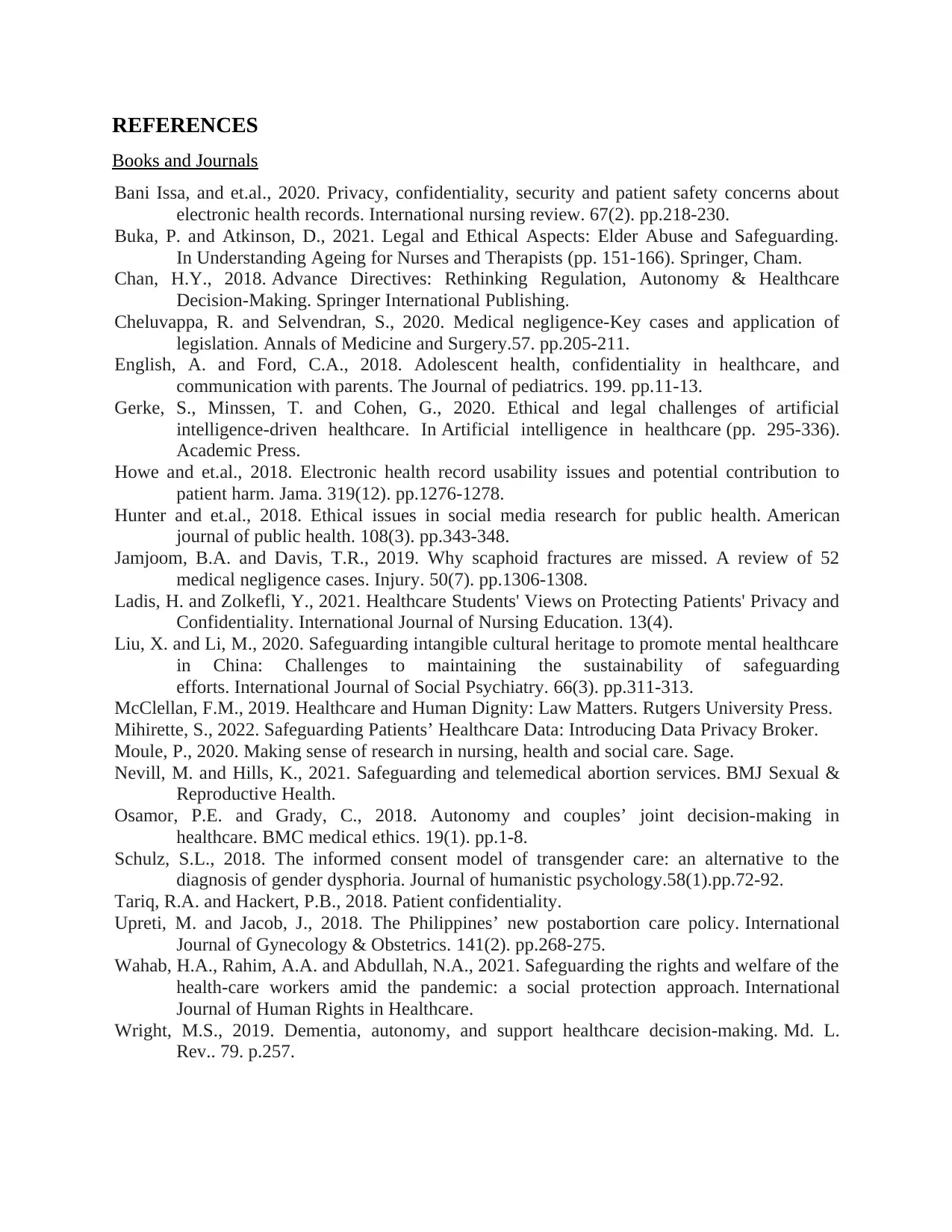
REFERENCES
Books and Journals
Bani Issa, and et.al., 2020. Privacy, confidentiality, security and patient safety concerns about
electronic health records. International nursing review. 67(2). pp.218-230.
Buka, P. and Atkinson, D., 2021. Legal and Ethical Aspects: Elder Abuse and Safeguarding.
In Understanding Ageing for Nurses and Therapists (pp. 151-166). Springer, Cham.
Chan, H.Y., 2018. Advance Directives: Rethinking Regulation, Autonomy & Healthcare
Decision-Making. Springer International Publishing.
Cheluvappa, R. and Selvendran, S., 2020. Medical negligence-Key cases and application of
legislation. Annals of Medicine and Surgery.57. pp.205-211.
English, A. and Ford, C.A., 2018. Adolescent health, confidentiality in healthcare, and
communication with parents. The Journal of pediatrics. 199. pp.11-13.
Gerke, S., Minssen, T. and Cohen, G., 2020. Ethical and legal challenges of artificial
intelligence-driven healthcare. In Artificial intelligence in healthcare (pp. 295-336).
Academic Press.
Howe and et.al., 2018. Electronic health record usability issues and potential contribution to
patient harm. Jama. 319(12). pp.1276-1278.
Hunter and et.al., 2018. Ethical issues in social media research for public health. American
journal of public health. 108(3). pp.343-348.
Jamjoom, B.A. and Davis, T.R., 2019. Why scaphoid fractures are missed. A review of 52
medical negligence cases. Injury. 50(7). pp.1306-1308.
Ladis, H. and Zolkefli, Y., 2021. Healthcare Students' Views on Protecting Patients' Privacy and
Confidentiality. International Journal of Nursing Education. 13(4).
Liu, X. and Li, M., 2020. Safeguarding intangible cultural heritage to promote mental healthcare
in China: Challenges to maintaining the sustainability of safeguarding
efforts. International Journal of Social Psychiatry. 66(3). pp.311-313.
McClellan, F.M., 2019. Healthcare and Human Dignity: Law Matters. Rutgers University Press.
Mihirette, S., 2022. Safeguarding Patients’ Healthcare Data: Introducing Data Privacy Broker.
Moule, P., 2020. Making sense of research in nursing, health and social care. Sage.
Nevill, M. and Hills, K., 2021. Safeguarding and telemedical abortion services. BMJ Sexual &
Reproductive Health.
Osamor, P.E. and Grady, C., 2018. Autonomy and couples’ joint decision-making in
healthcare. BMC medical ethics. 19(1). pp.1-8.
Schulz, S.L., 2018. The informed consent model of transgender care: an alternative to the
diagnosis of gender dysphoria. Journal of humanistic psychology.58(1).pp.72-92.
Tariq, R.A. and Hackert, P.B., 2018. Patient confidentiality.
Upreti, M. and Jacob, J., 2018. The Philippines’ new postabortion care policy. International
Journal of Gynecology & Obstetrics. 141(2). pp.268-275.
Wahab, H.A., Rahim, A.A. and Abdullah, N.A., 2021. Safeguarding the rights and welfare of the
health-care workers amid the pandemic: a social protection approach. International
Journal of Human Rights in Healthcare.
Wright, M.S., 2019. Dementia, autonomy, and support healthcare decision-making. Md. L.
Rev.. 79. p.257.
Books and Journals
Bani Issa, and et.al., 2020. Privacy, confidentiality, security and patient safety concerns about
electronic health records. International nursing review. 67(2). pp.218-230.
Buka, P. and Atkinson, D., 2021. Legal and Ethical Aspects: Elder Abuse and Safeguarding.
In Understanding Ageing for Nurses and Therapists (pp. 151-166). Springer, Cham.
Chan, H.Y., 2018. Advance Directives: Rethinking Regulation, Autonomy & Healthcare
Decision-Making. Springer International Publishing.
Cheluvappa, R. and Selvendran, S., 2020. Medical negligence-Key cases and application of
legislation. Annals of Medicine and Surgery.57. pp.205-211.
English, A. and Ford, C.A., 2018. Adolescent health, confidentiality in healthcare, and
communication with parents. The Journal of pediatrics. 199. pp.11-13.
Gerke, S., Minssen, T. and Cohen, G., 2020. Ethical and legal challenges of artificial
intelligence-driven healthcare. In Artificial intelligence in healthcare (pp. 295-336).
Academic Press.
Howe and et.al., 2018. Electronic health record usability issues and potential contribution to
patient harm. Jama. 319(12). pp.1276-1278.
Hunter and et.al., 2018. Ethical issues in social media research for public health. American
journal of public health. 108(3). pp.343-348.
Jamjoom, B.A. and Davis, T.R., 2019. Why scaphoid fractures are missed. A review of 52
medical negligence cases. Injury. 50(7). pp.1306-1308.
Ladis, H. and Zolkefli, Y., 2021. Healthcare Students' Views on Protecting Patients' Privacy and
Confidentiality. International Journal of Nursing Education. 13(4).
Liu, X. and Li, M., 2020. Safeguarding intangible cultural heritage to promote mental healthcare
in China: Challenges to maintaining the sustainability of safeguarding
efforts. International Journal of Social Psychiatry. 66(3). pp.311-313.
McClellan, F.M., 2019. Healthcare and Human Dignity: Law Matters. Rutgers University Press.
Mihirette, S., 2022. Safeguarding Patients’ Healthcare Data: Introducing Data Privacy Broker.
Moule, P., 2020. Making sense of research in nursing, health and social care. Sage.
Nevill, M. and Hills, K., 2021. Safeguarding and telemedical abortion services. BMJ Sexual &
Reproductive Health.
Osamor, P.E. and Grady, C., 2018. Autonomy and couples’ joint decision-making in
healthcare. BMC medical ethics. 19(1). pp.1-8.
Schulz, S.L., 2018. The informed consent model of transgender care: an alternative to the
diagnosis of gender dysphoria. Journal of humanistic psychology.58(1).pp.72-92.
Tariq, R.A. and Hackert, P.B., 2018. Patient confidentiality.
Upreti, M. and Jacob, J., 2018. The Philippines’ new postabortion care policy. International
Journal of Gynecology & Obstetrics. 141(2). pp.268-275.
Wahab, H.A., Rahim, A.A. and Abdullah, N.A., 2021. Safeguarding the rights and welfare of the
health-care workers amid the pandemic: a social protection approach. International
Journal of Human Rights in Healthcare.
Wright, M.S., 2019. Dementia, autonomy, and support healthcare decision-making. Md. L.
Rev.. 79. p.257.
1 out of 8
Related Documents
Your All-in-One AI-Powered Toolkit for Academic Success.
+13062052269
info@desklib.com
Available 24*7 on WhatsApp / Email
![[object Object]](/_next/static/media/star-bottom.7253800d.svg)
Unlock your academic potential
Copyright © 2020–2026 A2Z Services. All Rights Reserved. Developed and managed by ZUCOL.



